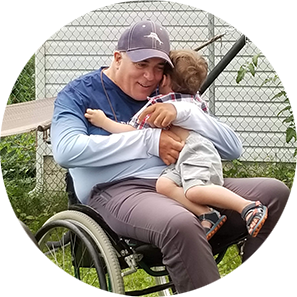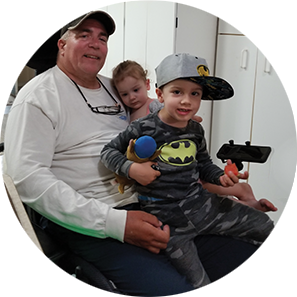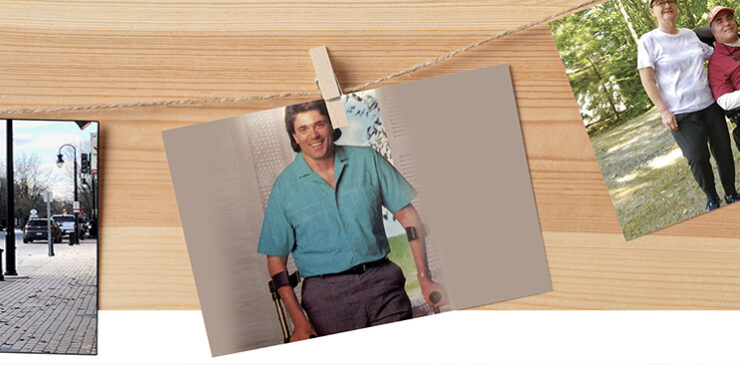Individuals with insight into what it is like to live with SCI can be the most significant source of knowledge and comfort for those just starting their journey. Regardless of the circumstances, there is trauma in acquiring an SCI and facing a future that you can’t envision. For SCIO’s Peer Mentors and our Peer Program Co-ordinators, helping people facing that trauma is their focus. But what about their trauma? How does working with newly injured people impact their mental health?
 Rick Watters was only 16 years old when a dive in the water on a hot day changed his life. Now, 44 years later, he has the life experiences you would expect from someone his age; career, marriage and family, plus insights and skills from living with an SCI. As a Peer Mentor and now Peer Program Co-ordinator, those life experiences help him connect with others who are starting their life after SCI, but that connection begins with Rick having to look back. “My natural inclination is to keep looking forward and focusing forward,” Rick says, “but our job is to live in the past quite a bit just to be able to empathize with the client.”
Rick Watters was only 16 years old when a dive in the water on a hot day changed his life. Now, 44 years later, he has the life experiences you would expect from someone his age; career, marriage and family, plus insights and skills from living with an SCI. As a Peer Mentor and now Peer Program Co-ordinator, those life experiences help him connect with others who are starting their life after SCI, but that connection begins with Rick having to look back. “My natural inclination is to keep looking forward and focusing forward,” Rick says, “but our job is to live in the past quite a bit just to be able to empathize with the client.”
Some days that is not an easy task. Rick can be presented with a situation that is too similar to his experience, taking him back to those early days. Four decades ago when Rick was injured, a patient’s mental health was not considered in their recovery. Treatment was geared toward the physical, with little attention paid to the mental, emotional or social well-being. Now, there is a greater understanding of the need to support patients’ mental health and while there is still a shortage of resources, it is much better than it was.
What isn’t better is the short hospital stays people who have incurred SCI have now. While it means they are medically stable, many are far from ready to return home or have a home ready for their new needs. They have yet to grasp how different their daily routines will be. In many cases, not having the supports in place means getting discharged to long-term care or making do while their name goes on waiting lists. Rick points out that they present programs and solutions to clients that provide hope, but they must manage the expectations because those solutions are not readily available.
“…our job is to live in the past quite a bit just to be able to empathize with the client.”
-Rick Watters
For the Peer Team, it’s hard sometimes not to take this home with them. Rick says, “It’s not always easy at the end of the day after hearing a lot of difficult situations. I try to put it into perspective and realize that, you know, this is something that other people are going through. I’ve been through it myself. Maybe some of the things they’re struggling with, I’m still struggling with. It does require a lot of practice to keep yourself healthy when you’re in those situations.”
So how does he keep himself healthy? For Rick, one of the keys to his mental health is taking care of his physical health. Doing all he can to maintain the functionality he has and minimize the impact of aging helps to keep him enjoying the activities he loves. The knowledge and resources he has gained from SCIO have also enabled him to understand how important it is to look after the whole package, mentally and physically. He keeps current on changes in treating secondary complications, pain management, and the benefits of physiotherapy and mindfulness.
 Family is another critical factor in maintaining a healthy outlook. Rick sees it in the units in the hospital when patients have received a visit from family; it just perks them up. However, it is vital to have the proper family support. One based on positivity and encouragement, not sorrow or perceptions of limitations. His own family brings Rick a great deal of happiness. Now a grandfather, he has had to teach the grandkids the same tricks he had to teach his daughter. He says, “I lower my chair and get them to climb up my body, then I can adjust my chair and move around the house or take them for a ride. So, it’s different, but it’s still really rewarding, and it’s one of those things I live for, just being able to spend time with my daughter and her family and enjoying those little moments in life.” As a result, Rick is motivated to keep healthy to continue enjoying his family and favourite activities.
Family is another critical factor in maintaining a healthy outlook. Rick sees it in the units in the hospital when patients have received a visit from family; it just perks them up. However, it is vital to have the proper family support. One based on positivity and encouragement, not sorrow or perceptions of limitations. His own family brings Rick a great deal of happiness. Now a grandfather, he has had to teach the grandkids the same tricks he had to teach his daughter. He says, “I lower my chair and get them to climb up my body, then I can adjust my chair and move around the house or take them for a ride. So, it’s different, but it’s still really rewarding, and it’s one of those things I live for, just being able to spend time with my daughter and her family and enjoying those little moments in life.” As a result, Rick is motivated to keep healthy to continue enjoying his family and favourite activities.
Helping someone who is newly injured see that there is a life ahead inspires Rick and other Peers. “I think that’s the rewarding part of our job. We show people what the possibilities are. We have wonderful peer volunteers that do amazing things in the community, and we hold them out as examples and have our peer volunteers talking to people to give them hope and show them what the possibilities are like. Some people think that disability is the end of your life. You just stay home until you expire. But if you can get through to people and show that there are some wonderful things you could be doing with your life and your life is not over after a spinal cord injury, that’s the real rewarding part and to see people thriving after a disability after their accident is very uplifting.”






